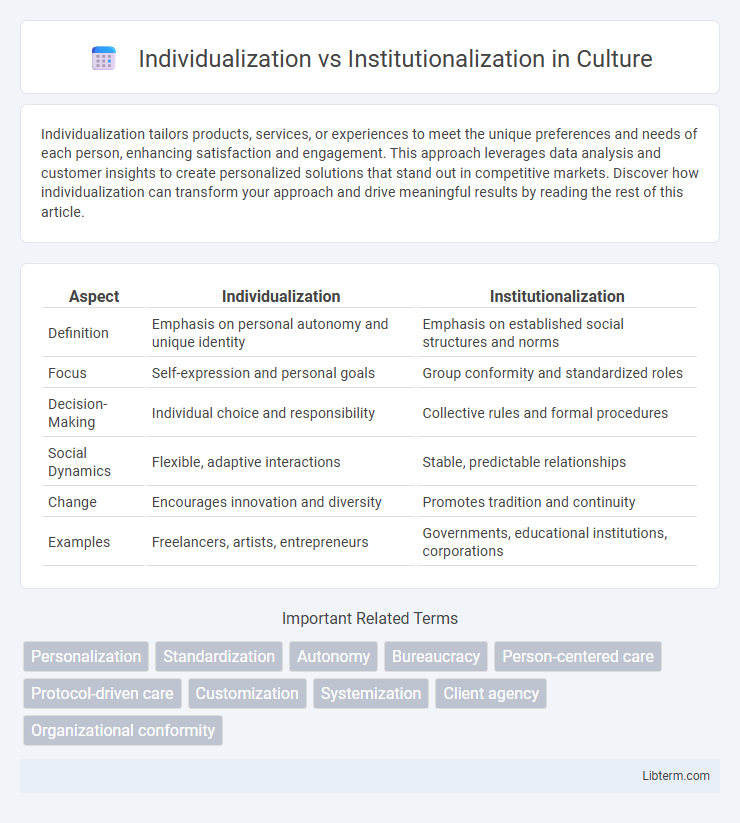Individualization tailors products, services, or experiences to meet the unique preferences and needs of each person, enhancing satisfaction and engagement. This approach leverages data analysis and customer insights to create personalized solutions that stand out in competitive markets. Discover how individualization can transform your approach and drive meaningful results by reading the rest of this article.
Table of Comparison
| Aspect | Individualization | Institutionalization |
|---|---|---|
| Definition | Emphasis on personal autonomy and unique identity | Emphasis on established social structures and norms |
| Focus | Self-expression and personal goals | Group conformity and standardized roles |
| Decision-Making | Individual choice and responsibility | Collective rules and formal procedures |
| Social Dynamics | Flexible, adaptive interactions | Stable, predictable relationships |
| Change | Encourages innovation and diversity | Promotes tradition and continuity |
| Examples | Freelancers, artists, entrepreneurs | Governments, educational institutions, corporations |
Understanding Individualization: Definition and Importance
Individualization refers to the process by which individuals develop unique identities, preferences, and behaviors distinct from collective norms. It plays a crucial role in fostering personal autonomy, creativity, and self-expression, enabling individuals to contribute innovatively within social and organizational contexts. Understanding individualization is essential for designing environments that balance personal freedom with social cohesion, promoting both individual well-being and institutional effectiveness.
The Concept of Institutionalization Explained
Institutionalization refers to the process by which certain practices, norms, or behaviors become established and embedded within organizations or societies, creating stable structures and predictable patterns. It involves formalizing roles, rules, and routines that shape interactions and decision-making, often enhancing efficiency and continuity. This contrasts with individualization, which emphasizes personal autonomy and unique identity over conformity to collective standards.
Historical Evolution: From Institutionalization to Individualization
The historical evolution from institutionalization to individualization reflects a shift from rigid, standardized social structures towards personalized approaches recognizing individual agency and diversity. Institutions once dominated social order by enforcing conformity through centralized norms and practices, but modern society increasingly values autonomy, self-expression, and customized experiences. This transition is evident in education, healthcare, and governance, where policies now emphasize individual rights, choice, and empowerment over uniform institutional control.
Key Differences Between Individualization and Institutionalization
Individualization emphasizes personalized experiences, tailoring services and approaches to meet unique individual needs, while institutionalization prioritizes standardized procedures and collective norms established within organizations or systems. Individualization fosters autonomy and customized solutions, whereas institutionalization reinforces conformity, consistency, and structural stability across groups. Key differences lie in the focus on personal agency versus organizational control, flexibility versus uniformity, and adaptive change versus procedural continuity.
Impact on Human Rights and Personal Autonomy
Individualization enhances personal autonomy by promoting self-expression and tailored rights protection, allowing individuals greater control over their identity and decisions. Institutionalization often standardizes rights enforcement, which can limit personal freedoms but provides structured mechanisms for accountability and social order. The balance between these approaches critically shapes human rights outcomes, with individualization fostering diversity and institutionalization ensuring enforceability and stability.
Psychological and Social Implications
Individualization emphasizes personal autonomy and self-expression, often leading to enhanced psychological well-being but increased feelings of isolation and anxiety due to weakened social bonds. Institutionalization provides structured social roles and collective identity, fostering stability and social support but potentially suppressing individuality and causing psychological distress linked to conformity. Balancing these dynamics is critical for mental health, as excessive individualization can result in alienation, while over-institutionalization may limit personal growth and self-determination.
Individualization in Modern Healthcare and Education
Individualization in modern healthcare emphasizes personalized treatment plans tailored to patients' genetic profiles, lifestyle, and specific health conditions, enhancing therapeutic outcomes and patient satisfaction. In education, individualization promotes adaptive learning technologies and customized curricula that address diverse student needs, learning paces, and cognitive styles, fostering better engagement and academic performance. This shift towards individual-focused approaches contrasts with institutionalization's standardized protocols, highlighting a growing preference for flexibility and personalization in service delivery.
Challenges and Criticisms of Institutionalization
Institutionalization faces challenges such as loss of personal autonomy, where individuals often encounter rigid routines and standardized care that can hinder self-expression and personal growth. Critics highlight the depersonalization effect and social isolation caused by institutional settings, which can exacerbate mental health issues and reduce quality of life. Furthermore, institutional environments may struggle with inadequate staff-to-patient ratios and lack of personalized support, leading to neglect and insufficient individualized care.
The Role of Technology in Fostering Individualization
Technology empowers individualization by enabling personalized learning experiences through adaptive algorithms and data-driven insights. Digital platforms facilitate tailored content delivery and skill development, addressing unique preferences and learning paces. This shift enhances user autonomy while challenging traditional institutional structures to integrate flexible, technology-driven solutions.
Future Trends: Balancing Individual Needs and Institutional Structures
Future trends in individualization versus institutionalization emphasize personalized solutions that integrate advanced technologies to meet diverse user needs while maintaining scalable and efficient institutional frameworks. Adaptive AI-driven platforms and data analytics enable institutions to offer tailored services without sacrificing systemic stability or resource allocation. This balance fosters innovation in education, healthcare, and governance by aligning individual preferences with organizational goals and societal standards.
Individualization Infographic

 libterm.com
libterm.com